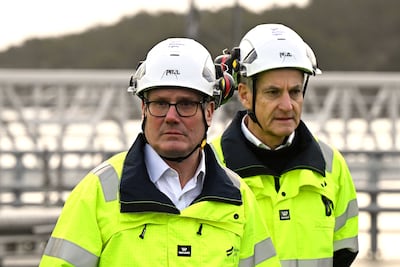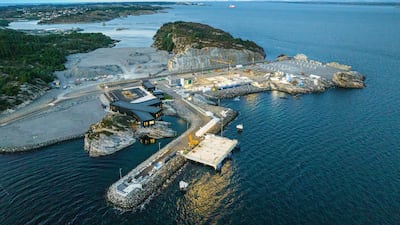If a business can’t stop emitting the greenhouse gases warming up the Earth, how about capturing the load, sending them to Norway and never to be seen again?
Dispatching unwanted CO2 across borders by pipeline and sea is about to become a reality. A project called Northern Lights will begin operations in Europe's far north in 2025, offering transport and storage deep under the sea “as a service”.
Several European countries are keen on the idea. Britain believes it can store 78 billion tonnes of CO2 on its continental shelf, more than the world’s annual emissions. Saudi Arabia and Britain said in 2024 they would work together on “carrying the message” in favour of the technology. Belgium and the Netherlands could act as stations on the route to the seabed.
In years to come there are plans for a fully-fledged pipeline known as the CO2 Highway criss-crossing the North Sea. Buried deep underwater, the carbon would never enter the Earth’s atmosphere where it traps heat and drives climate change and extreme weather.
The infant industry has had teething problems with its technology, and faces what insiders call a "missing money gap" between the cost of investment and the potential reward. There is also the risk of investing in CO2 storage only to find there are no ready customers.
Then there are political objections. Carbon capture and storage (CCS) is viewed with suspicion by climate activists, who see it as a get-out-of-jail-free card.
“There’s a whole set of objectors who are really trying to cancel CCS because they want to cancel oil and gas production,” said Stuart Haszeldine, a University of Edinburgh professor of carbon capture who has advised the UK and Scottish governments on the issue. He said he could understand why given the role of fossil fuels in driving global warming.
“The world’s left this for so long that there’s very few alternatives now,” he told The National. “You either cancel all oil and gas production, with huge social disruption and civilisational risk, or you have to try very hard to decrease fossil fuel use but capture and recapture as much CO2 as you possibly can.”

In the Northern Lights project, CO2 captured on land will be turned into liquid, sail to a terminal in Oygarden, near Bergen, which was completed in September, then be piped under the sea and injected into a rock formation 2,600 metres below sea level.
Absorbing risks
Some new CO2 emissions will arise from burning shipping fuel. The operators of Northern Lights say these will be 97 per cent lower than the volume of emissions being spared from the atmosphere.
“Northern Lights is offering a CO2 transport and storage service to a third party, to industry that wants to decarbonise,” Equinor’s vice president in charge of carbon capture, Torbjorg Heskestad, told a recent investor conference in London.
She also identified the risk to operators: “that we invest in transport and storage but there is no customer ready to supply CO2”. At present it costs less to emit than it costs to invest in carbon capture, she said. The first two customers are a Norwegian cement factory and a waste-to-energy plant in Oslo whose carbon capture facilities are state-funded.
“The Norwegians are really handling that by state ownership of most of the projects,” Prof Haszeldine said. “The state is taking on board that liability of cross-chain lack of delivery in the first part of the project.” Although Norway is not an EU member, Northern Lights “is still an essential project for Europe to realise and to work out”, he said.

Two more customers for Northern Lights have been identified in Denmark and the Netherlands. The UK also hopes to develop a commercial carbon capture industry, recently making £21.7 billion ($27.66 billion) of public money available over 25 years. On a recent visit to Norway, Britain's Prime Minister Keir Starmer agreed to work on a two-way arrangement to transport CO2 across borders.
Plans for the eventual CO2 Highway envisage more than 1,000km of pipelines connecting ports in northern Europe, including in Belgium and the Netherlands. According to the Global CCS Institute there are 50 global projects in operation, 44 under construction and 534 in various stages of development.
Super highway
A typical user is a factory or industrial plant where there is no easy alternative to burning fossil fuels, such as in steel, cement or chemicals manufacturing. A group of 23 pro-CCS countries including the UAE, Bahrain and Egypt who held talks at the recent Cop29 climate summit in Azerbaijan plan to get projects moving by 2030 that would store a gigatonne of CO2 every year.
Various other speakers decried carbon capture during Cop29 as a “false solution”, a “risky technology” or a “pipe dream”. Brazil, one of the countries to present a new emissions-cutting plan in Azerbaijan, said it would use carbon capture to enable an expansion of biofuel production. The UK-Saudi marketing campaign will seek to “build the awareness that is needed” of the advantages of carbon capture, British representative Kerry McCarthy said.
Several first-of-a-kind carbon capture projects have “had problems in getting going and problems in building up to their design capacity,” said Prof Haszeldine. “But those projects are working. They’re being improved all the time, and the second generation of projects following on will really learn from all of that and are expected to be both cheaper and more effective.”

